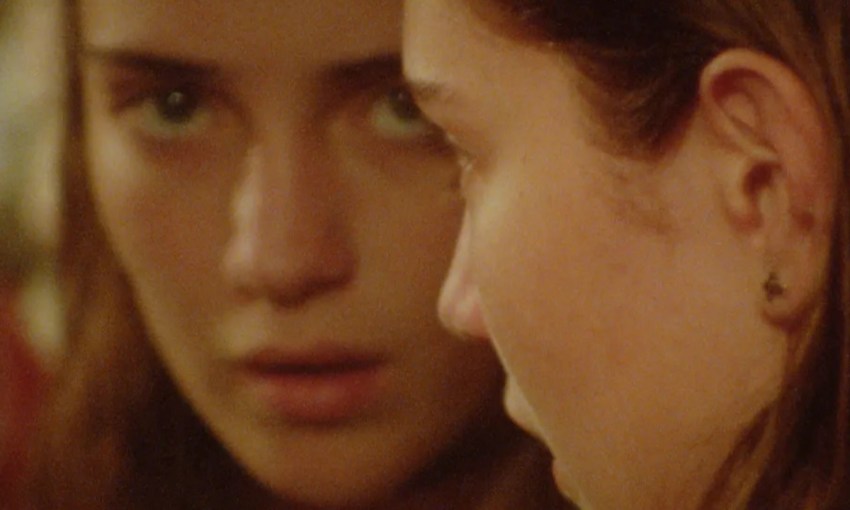A gritty aesthetic complements an amusing, dream-like satire in Sean Price Williams’s directorial debut.
AFF review: The Sweet East
Chaotic thrills, mindful commentary and satirical gags at the expense of radical individuals are at the centre of Sean Price Williams’s experimental indie film, The Sweet East.
The story follows Lillian (Talia Ryder), a reserved, yet daring teen on journey of self-discovery, drifting between crowds of people with combative world views.
‘The Sweet East’ screens again on Thursday 26th October (9:00pm) at Palace Nova Eastend.
See the full program here.
Drawing from his previous work as a cinematographer for the Safdie brothers, the masterminds behind Heaven Knows What (2014) and Good Time (2017), Williams displays a penchant for capturing the human experience through a suspenseful, deeply psychological lens. His visual language consists of shaky camerawork, relentless close-ups and an expansive, pastel colour palette.
Despite its dreamy flow, The Sweet East keeps you on your toes throughout its run by constantly shifting its narrative direction when you least expect it – dropping established characters, and introducing new ones.
Lillian’s adventure through the eastern cities and woods of the United States is broken into chapters, each representing a different lifestyle influential to her ever-changing view of things.
This review was provided by the “2023 Emerging Screen Critics Program” – a Screen Studies collaboration between the Adelaide Film Festival and UniSA Creative, with the participation of students and mentors from the University of South Australia, the University of Adelaide and Flinders University. Supported by CityMag.
The film begins with Lillian ditching her school life to join a group of crazed outcasts who express to her the importance of independence. Her time with them is short-lived, as she quickly meets and forms a bond with Lawrence (Simon Rex), a dubious middle-aged man with some shady dealings. The pair share a seemingly pleasant time together before Lillian jumps ship and is taken in by two New Yorker filmmakers (Ayo Edebiri, Jeremy O. Harris) who induct her into the indie film scene.
This series of distinct plot lines not only allows the film to heighten suspense whenever needed but also sheds light on numerous philosophies, as each person Lillian meets has something to say.
Throughout the film, Williams strives for immersion, often anchoring scenes within Lillian’s subjectivity – every sound she hears and every image she sees is accentuated through the editing and cinematography, prompting the idea that the film is more of a nightmarish trip than a story based in reality.
The blasting club music and the constant chatter, mixed with acute sound effects such as gun shots, generate an auditory overload that reflects the overwhelming amount of new information Lillian is regularly receiving. Similarly, expressive camerawork helps communicate her distress, with frenetic tracking shots and close-ups effectively conveying a claustrophobic atmosphere. As seen in the reception of Uncut Gems (2019), this disorienting style of filmmaking may be a turn-off for some viewers, however, it portrays Lillian as a sympathetic character and allows for a unique, sensory experience.
A major strength of The Sweet East is its satirical comedy, which underscores the notion that political ideals can consume one’s life to a detrimental effect. In a particularly memorable scene, indie filmmakers Molly and Matthew, become fully engrossed in a dialogue about their upcoming film and the importance of good casting. The humour stems from the actors’ larger-than-life performances that mock the pretentious, self-indulgent nature of political activism – their statements, vocal projections, and facial expressions are all exceedingly animated and somewhat robotic.
Williams’ satire also serves to alleviate tension during earlier scenes between Lillian and Lawrence – creepy undertones are punctuated with humorous line deliveries that critique Trump’s America. This effect is achieved through a combination of clever editing, Rex’s light-hearted and sometimes deadpan performance, and the blunt non-acknowledgement of outrageous remarks.
While this form of comedy might not appeal to everyone, it effectively injects life, amusement, and layers of meaning into what could have potentially been a series of dull conversations.
With its dizzying visuals, disorienting soundscapes and a cast of characters as enigmatic as they are comical, Williams’s film is a kaleidoscopic dive into the complexities of self-discovery and social dogmas.
Just like its protagonist, this film takes you on a wild ride, leaving you both bewildered and beguiled, questioning the very fabric of our social fabric.




